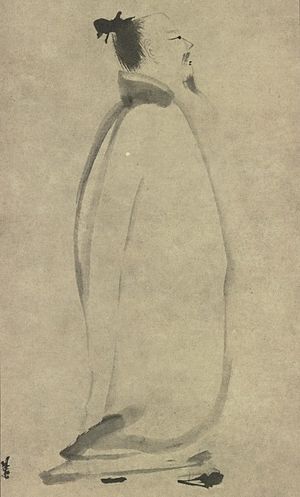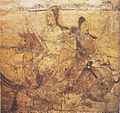Li Bai facts for kids
Quick facts for kids
Lǐ Bái
|
|||||||||||||||||||||||||||||
|---|---|---|---|---|---|---|---|---|---|---|---|---|---|---|---|---|---|---|---|---|---|---|---|---|---|---|---|---|---|

Li Bai In Stroll, by Liang Kai (1140–1210)
|
|||||||||||||||||||||||||||||
| Born | 701 Suiye, Tang Empire (now Chuy Region, Kyrgyzstan) |
||||||||||||||||||||||||||||
| Died | 762 Dangtu, Tang Empire (now Ma'anshan, Anhui Province, China) |
||||||||||||||||||||||||||||
| Occupation | Poet | ||||||||||||||||||||||||||||
| Nationality | Chinese | ||||||||||||||||||||||||||||
| Period | Tang dynasty | ||||||||||||||||||||||||||||
| Chinese name | |||||||||||||||||||||||||||||
| Chinese | 李白 | ||||||||||||||||||||||||||||
|
|||||||||||||||||||||||||||||
| Taibai | |||||||||||||||||||||||||||||
| Chinese | 太白 | ||||||||||||||||||||||||||||
|
|||||||||||||||||||||||||||||
| Qinglian Jushi | |||||||||||||||||||||||||||||
| Traditional Chinese | 青蓮居士 | ||||||||||||||||||||||||||||
| Simplified Chinese | 青莲居士 | ||||||||||||||||||||||||||||
| Literal meaning | Lotus Householder | ||||||||||||||||||||||||||||
|
|||||||||||||||||||||||||||||
| Vietnamese name | |||||||||||||||||||||||||||||
| Vietnamese | Lý Bạch | ||||||||||||||||||||||||||||
| Korean name | |||||||||||||||||||||||||||||
| Hangul | 이백 | ||||||||||||||||||||||||||||
| Hanja | 李白 | ||||||||||||||||||||||||||||
|
|||||||||||||||||||||||||||||
| Japanese name | |||||||||||||||||||||||||||||
| Kanji | 李白 | ||||||||||||||||||||||||||||
| Hiragana | りはく | ||||||||||||||||||||||||||||
|
|||||||||||||||||||||||||||||
Li Bai (born 701, died 762) was a very famous Chinese poet. People also know him as Li Bo or Li Po. He is often seen as one of the two greatest poets in China's history, along with his friend Du Fu. We still have about 1,100 of his poems today!
Li Bai's poems were first shared in Western languages in 1862. Later, in 1901, Herbert Allen Giles helped introduce his works to English speakers. Ezra Pound also made popular translations of his poems.
Li Bai is famous for using lots of imagination and Taoist ideas in his writing. He loved to travel and spent much of his life exploring. There's a well-known story that he drowned in the Yangtze River. People say he fell from his boat while trying to hug the moon's reflection in the water!
Contents
Li Bai's Life Story
Early Years and Adventures
Li Bai was probably born in Central Asia around the year 701. His family had lived there for a long time. He grew up in a family that wasn't very rich. His father was a merchant, someone who buys and sells goods.
Li Bai didn't go to a regular school when he was young. But he was always very good with words, even as a small boy. In 705, his family moved back to Mien-chou in Sichuan, China. This is where he spent most of his childhood.
As Li Bai got older, he became skilled at sword fighting. In his teenage years, he traveled all over Sichuan. He was like a "knight-errant," a person who travels around helping others. When he was 25, he traveled to Central China. In 727, he went to A-lu in Hubei and married the daughter of a retired prime minister. He continued to explore the natural world around him.
Journeys and Fame
In 735, Li Bai traveled north to the Yellow River and east to the Yangtze River. His journeys were a big part of his life. In 742, he went to Chang'an, which was a very important city. There, he met the Emperor of China.
The Emperor was very impressed with Li Bai and liked him a lot. He gave Li Bai a special job at the Hanlin Academy. This meant Li Bai got a lot of attention from other important scholars and officials.
However, in 744, Li Bai decided to leave Chang'an. He found the fancy city life boring. A year later, he met his poet friend Du Fu in Loyang. Around this time, Li Bai also became a follower of Taoism. This was a big change that affected the rest of his life.
After settling his family in Loyang, he went on another long journey. He spent ten years traveling around northern China. During this time, his poems started to show his new interest in Taoism. They were less about knightly adventures. Even though he was famous, Li Bai sometimes had problems with money and owning property.
Li Bai's Poetry
Li Bai is most famous for his amazing and clever poetry. His poems often describe nature in a very romantic way. They also share his thoughts on right and wrong, and even on death. He was popular with both rich nobles and ordinary people during his time. Many people think he was one of the four best poets of the Tang Dynasty.
He was also known for his Taoist beliefs. He often wrote in a way that went against the traditional ideas of Confucianism.
One of Li Bai's most famous poems is Drinking Alone by Moonlight. The Chinese title is Yuè Xià Dú Zhuó. This poem is a great example of his style. It's very natural and feels like it was written on the spot. He actually wrote several poems with this same title!
Lasting Impact
Li Bai's poetry has had a big impact around the world. In the West, his poems became well-known partly because of Ezra Pound's translations. One famous example is The River Merchant's Wife: A Letter. In the East, he influenced poets like Mi Fei during the Song Dynasty.
There is even a crater on the planet Mercury named after him!
Images for kids
-
The only known writing in Li Bai's own hand. It's called Shangyangtai (To Yangtai Temple) and is kept at the Palace Museum in Beijing.
See also
 In Spanish: Li Bai para niños
In Spanish: Li Bai para niños







